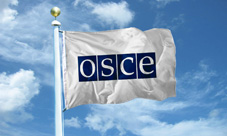
Int’l Observers See Positive and Negative trends in Georgian elections
By Gvantsa Gabekhadze
Wednesday, October 31
International organizations who were observing October 28 presidential elections in Georgia have released their preliminary assessments of the election process, which included both positive and negative evaluations.
OSCE/ODIHR says that the election was competitive and professionally administered. Candidates were able to campaign freely and voters had a genuine choice, although there were instances of misuse of administrative resources, and senior state officials from the ruling party were involved in the campaign.
“Substantial imbalance in donations and excessively high spending limits further contributed to an unlevel playing field. While public broadcasters provided all candidates a platform to present their views, the sharp polarization of the private media, negative campaigning and harsh rhetoric, and lack of analytical reporting limited voters’ ability to make a fully informed choice,” OSCE/ODIHR said.
The report reads that the legal changes that increased the representation of the ruling party at all election administration levels and the insufficient transparency in the selection of non-partisan members “undermined the perception of impartiality”.
“Nevertheless, election day generally proceeded in a professional, orderly and transparent manner, despite some procedural issues during counting, as well as many citizen observers and media acting on behalf of political parties and party supporters potentially influencing voters outside polling stations,” OSCE/ODIHR said.
NDI stated that the pre-election period was marked by both positive and negative features.
“The Central Election Commission (CEC) carried out its preparations efficiently and met its deadlines, although was confronted with concerns about the neutrality of its officials. Voters had electoral choices and the campaign was lively and dynamic, although filled with vitriol and personal attacks. The media environment, although polarized, offered citizens a variety of viewpoints,” NDI says.
The Georgian representation of the American organization says that In addition to financial pressures on the sector as a whole, some outlets came under political and legal pressure.
“Most striking about this election were the aggressive, personalized, and unprecedented attacks by senior state officials against the country’s most respected civil society organizations (CSOs) and their leaders. While CSOs are not above criticism, these attacks represent a distinct departure from the otherwise constructive, if not occasionally tense, the relationship between government and civil society in Georgia,” NDI says.
Maja Kocijancic, Spokesperson for Foreign Affairs and Security Policy/European Neighbourhood Policy and Enlargement Negotiations stated that some shortcomings were noted throughout the campaign and on the election day, notably the instances of misuse of administrative resources, the sharp polarisation of the private media, negative campaigning and harsh rhetoric.
Fifty-eight international organizations were observing the presidential election in Georgia.


